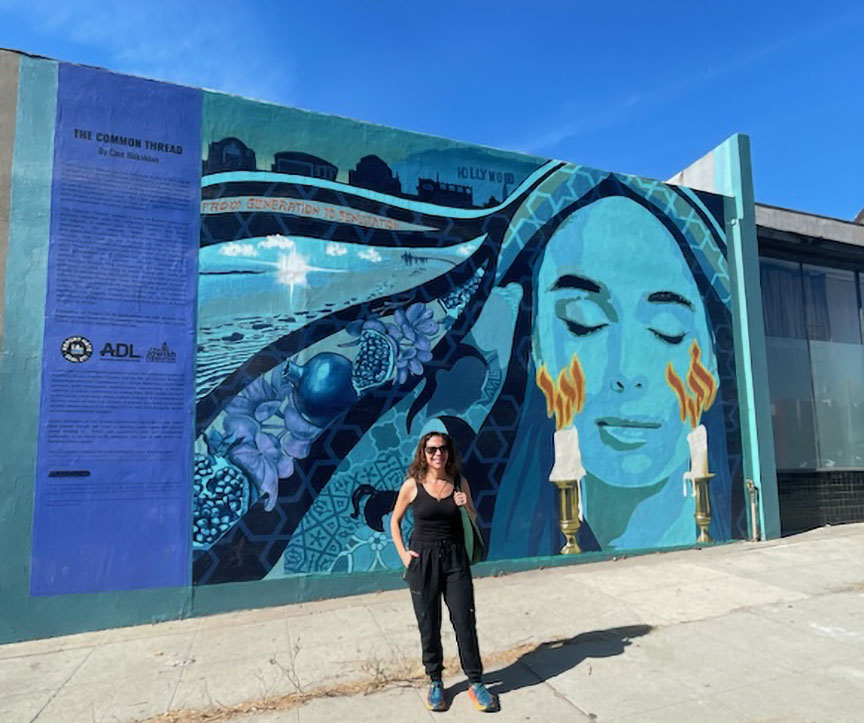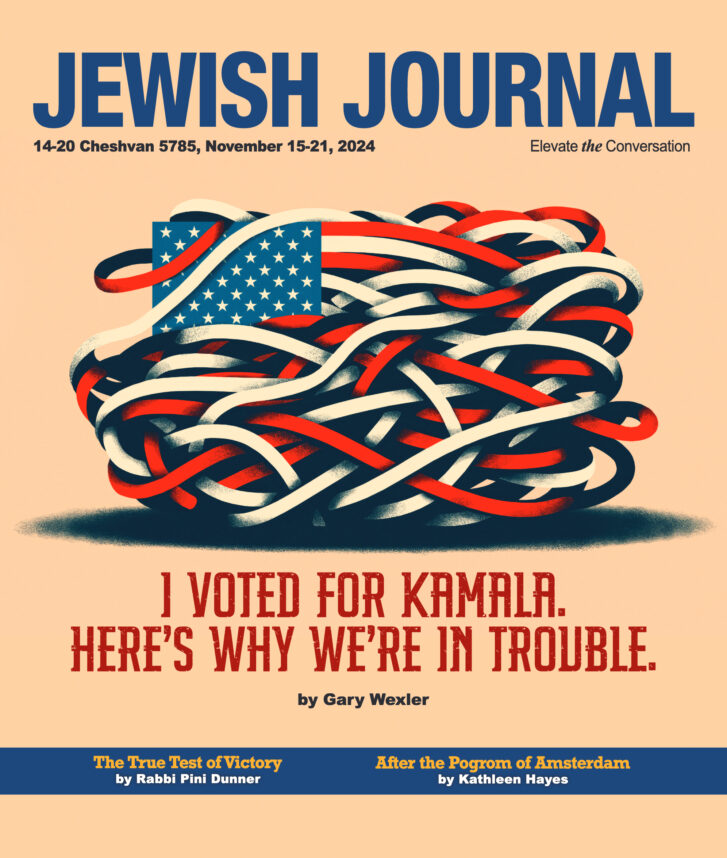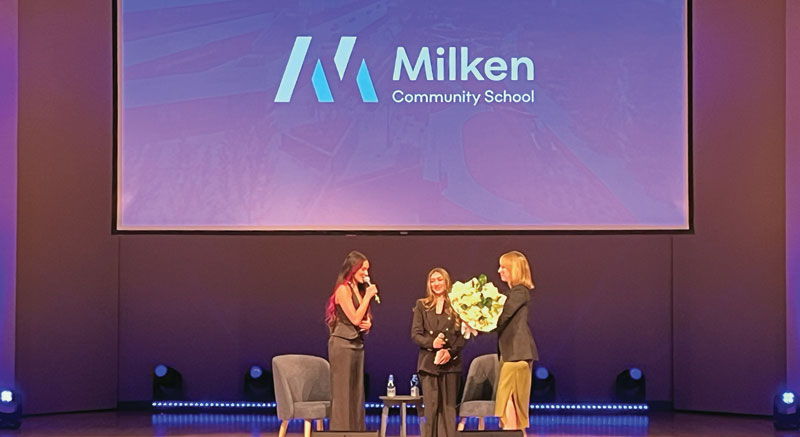Daniel Rosove, Program Director at MAZON: A Jewish Response to Hunger spoke at Temple Israel of Hollywood this past Kabalat Shabbat as part of “Human Rights Shabbat.” The following is edited from his presentation:
My Dad says that “loving the stranger for you were strangers in the land of Egypt” (Deut. 10:18-19) may be the most difficult mitzvah in the Torah. I agree.
Universal humanity, dignity, equality; the right to justice, love, compassion and respect. The golden rule. These are but some of the meanings you can draw from “welcoming the stranger.” Though difficult, it is essential.
It is this moral world view that led me to MAZON, a non-partisan voice on food insecurity working to end hunger and its causes among all Americans and Israelis of all faiths and backgrounds. We do this through government affairs, education and strategic investment and partnerships in the anti-hunger and economic justice sectors.
Food insecurity is defined as not having reliable access to a sufficient quantity of affordable and nutritious food. Basically, it is being unsure where one’s next meal will come from.
The US Census and Department of Agriculture’s 2017 annual report on food security of America’s 127 million households found the following: 12% or 15 million households experienced food insecurity in 2017 – 40 million people – some 27.5 million adults and 12.5 million children – 12.5% of the population. Think about it. That’s larger than the population of Canada.
58% of eligible families and individuals participate in the US nutrition safety net. These programs range from Supplemental Nutrition Assistance Program (known as SNAP, formerly as Food Stamps), a special program for women, infants and children (known as WIC), school meals, after school and summer feeding programs, senior feeding programs and more.
Food insecurity affects some populations more than the national average. Households headed by single women with children experience 30% food insecurity. African American-headed households – more than 20%, and Hispanic-headed households 18%. Large regional differences also exist with the majority of the country’s food insecure living in the South, followed by Midwest, Northeast, and West.
With nutrition programs administered on the state level, debates on these issues are guided by a state’s executive and legislative branches, economic prosperity and the strength and vitality of its advocacy and direct service sectors. Unfortunately, these debates have become partisan and ideological. If you are to the right of the political spectrum, you are more hostile to government aid programs and spending. If you are to the left of the political spectrum you are more in favor of government solutions.
On the federal level, the current Congress and the Trump Administration have represented a once in a generation existential threat to the federal safety net. We have seen the public discourse coarsen.
Today – Monday, December 10, the Department of Homeland Security is closing its public comment period on a new rule that would change how non-cash assistance to legal immigrants is calculated, making Medicaid, SNAP, school meals and housing assistance count as “cash assistance.” This would make someone classified as a “Public Charge” or someone deemed too reliant on federal aid, which for legal immigrants could negatively affect their status.
The proposed rule, in effect uses the feeding of one’s children as a cudgel against the parents. It means whole families won’t have access to SNAP and it may affect 382,000 people a year.
One study shows 1 in 4 children in the US have an immigrant parent. It has been widely reported that a chilling effect has settled within the legal immigrant community in the US with many declining enrollment in critical and available programs.
We should ask ourselves: should access to nutrition be a civil right? Should it be a human right?
Erwin Chemerinsky, the distinguished Dean of the Berkeley Law School, Jesse H. Choper Distinguished Professor of Law, and Chair of MAZON’s Legal Advisory Council, asserts that the US Constitution’s “Due process clause…prevents government from depriving a person of life, liberty or property without due process of law.”
He argues that “government inaction in the face of hunger and starvation which results in harm or death can be viewed as a constitutional violation.”
The human right to food was first declared in Article 25 of the UN Universal Declaration of Human Rights in 1948: “Everyone has the right to a standard of living adequate for the health and well-being of himself and of his family, including food, clothing, housing and medical care and necessary social services.”
In the 1979 Convention on the Elimination of All forms of Discrimination Against Women, a woman’s right to health includes “adequate nutrition during pregnancy and lactation.”
The 1989 Convention on the Rights of the Child declares a government’s obligation to provide healthcare and adequate nutritious food to children. Access to nutrition should be a civil right in the US and access to nutrition a universal human right. Lack of nutrition is one of the largest impediments to personal and national progress. It disproportionately affects women and children. It holds people back from realizing their full potential.
How can we tackle such an immense issue?
First, we must make clear to our elected officials and candidates for office on all levels that this is an issue of great importance to our community and our country. And we must help our elected officials understand that charity cannot do it alone. Food banks and pantries, soup kitchens and canned food drives are essential but not sufficient. It is only a wide ranging, coordinated and well-resourced government response that can help the tens of millions of Americans access the nutrition they need.
We must fight divisive rhetoric blaming the food insecure by writing them off as takers, undeserving or drags on society. In many cases they are blameless – children.
We can direct our philanthropic dollars and time towards organizations that aim to fight the root causes and systemic issues affecting food insecurity that work to strengthen the safety net and engage in the public policy, like MAZON, rather than solely engage with direct service organizations.
You can go online to the “Protecting Immigrant Families Coalition” to submit a comment to the Department of Homeland Security opposing their proposed change to the public charge rule, which would hurt hundreds of thousands of legal immigrant families.
Please do so today, before the close of Monday, December 10.
We must not give up. Each of us cannot close ourselves off to this critical human and civil rights issue. We cannot forget the ger, the “other,” those in the shadows. We cannot deny them their human dignity.





















 More news and opinions than at a Shabbat dinner, right in your inbox.
More news and opinions than at a Shabbat dinner, right in your inbox.